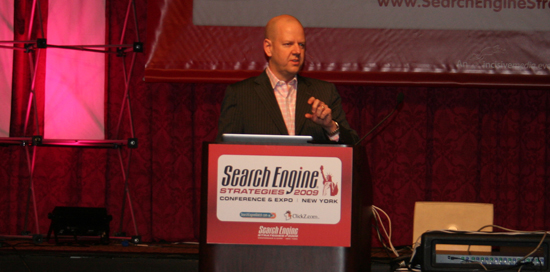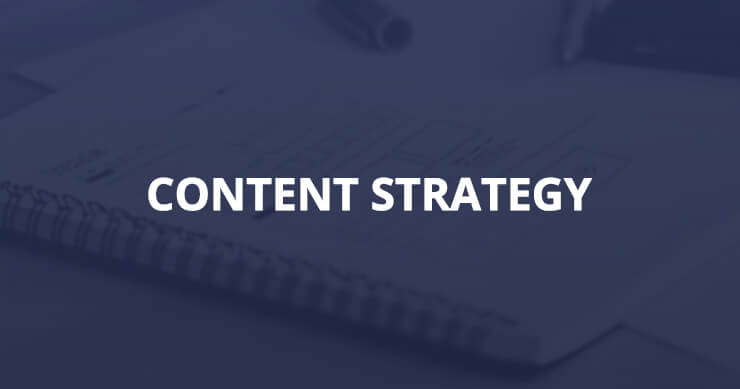Buckle in, folks. We’ve got one final day of Search Engine Strategies New York to get through. That means five more sessions til I can put the liveblogging on hold until June. [exhales deep]
Let’s go.
Good morning! It’s Day 3 at SES NY and John Gerzema is here to give us a morning keynote. This place is an absolute ghost town this morning. I don’t know if people are still asleep or if they were only interested in the expo, but there are not a lot of bodies here. But my body is here. That’s what’s most important.

John Gerzema Keynote – Photo used with permission by SearchCowboys.com
Also curious was the music selection before the keynote started. It was a nice medley of Billy Joel classics. :) It’s been very smooth jazz-esque all week. And yes, I know Billy Joel is not smooth jazz. I grew up on Long Island. Don’t test me on my Billy Joel knowledge. It would make your head explode.
John starts off. Marketing is your way out of the recession. In 2008, there was a credit crisis that shook the world to its core. Now we’re seeing a confidence crisis.
Managing for an upturn
We have to focus on being positive! Every business knows you need to have superior cash flow and sustainable growth. That’s exactly the same thing every consumer is doing today. People are cutting household budgets to save money. They’re reappraising what they’re doing. Some people are looking at new careers or starting their own [Woot!], some are going back to school. We need to align our brand and our business strategy. This is the time to capture talent and quality. We need to do more with less, to sharpen our message, return to our core and face our customer.
We’ve seen $36 trillion loss worldwide. None of us have lived through this before. Most of us were born after World World II.
The New Fear Economy
- Unemployment is up
- House values are down
- Equity markets are down
- Bailout?
- National debt is up
- Detroit is down
- Bank lending is down
- Credit card exposure is the new bubble
It all equals a consumer confidence that is in question. Confidence is at its lowest since the Consumer Confidence study was started. Housing values have eroded around all 50 states. In Detroit, the average price of a home is 18k. The consumer has nowhere to turn. People used to rely on their houses as their source of income. You can’t use your house as an ATM anymore. That avenue is cut off.
The big thing that’s hit the consumer psyche really hard is the threat of unemployment. Unemployment is the highest in 25 years. We’ve seen the third straight month of 6000,000 jobs lost. It’s an incredibly disturbing time for employees.
How is this going to bottom out?
This is an equal opportunity recession. Millionaires have lost 1/3 of their net worth. [Aw. Poor babies.] We’re looking at people giving up their pets. [Oh, noes! I’ll give you Swat, if you want?]
The consumer doesn’t feel safe anymore. They’ve been knocked down. The interesting thing about this is that this focus is running into social media. People are trying to build themselves up and to make themselves feel important and to solve problems [We were just insulted? I think we were maybe insulted? Let me validate myself and ask Twitter.]. We’re focusing on safety and our basic Maslow needs. 14,000 Americans are losing health insurance every day. People are delaying having children and are looking at basic needs.
The only certainty is uncertainty. From 2001-2008, 1/3 of people are concerned that today’s younger generation won’t be better than the generation that came before. No one knows where we’re going. It’s hard to rely on our leaders.
Who do you trust? We have a cultural shift in consumerism based on trust.
- Lack of leadership and responsibilty.
- Selfishness and collusion
- Prolonged conflict
- Egregious and criminal behavior
- Failure of regulators
- Taxpayers are now shareholders
- Decaying infrastructure
- Lack of permanence
- The new cultural fault line
The above is where his book The Brand Bubble came from. They found that brands now represent 1/3 of all operating value in the company. That’s an 80 percent growth in two years. Brands are a huge sector in our global economy. Brand esteem and regard is down 12 percent. Brand awareness has declined 20 percent. Perception of brand quality is down 24 percent. Trust in brands is down 50 percent. This led up to the crisis in 2008. Trust has continued to erode. He went into their database and found that the two things people are worried about in brands are:
- Quality
- Trust
We just kind of assume trust. We had a good product and good customer service. We didn’t care about trust in our brands. People are rethinking the value of trust in brands now. Over the past quarter, a trust virus has infected many categories. There’s an apature opening.
How do you start to connect with consumers?
Consumers are beginning to own their problems. They realize there’s a long, hard slog ahead. Things have changed and we’re not going to get out of it very quickly. It takes 5-10 years to come out of the challenges that we’re facing. The savings rate has risen in the past 5 months, taking us back to what we were saving back in the 70s. Spending has fell 3.7 percent from Q3, steepest decline in 62 years.
[Okay, can we get to brands now? Too much economy talk. This is depressing.]
You have to create your competitive advantage NOW. How you act now will forever shape your future performance.
- New culture values: We have an indestructable spirit. There’s no safety net so we have to do things for ourselves [Hear that, big brands?]. You have to focus on short term and long term goals. You have to make things last.
- New consumer behaviors: Durable living. Rise in things like shoe repair. We’re seeing that in clothing. Comfort foods are back into the households. Americans are holding on to their cars longer — 9.4 years [yowsa. i can’t imagine having anything in my life that long.]. Couponing is up 300 percent. People are nesting more. 68 percent of Americans carry a library card. [What’s a library? [smacks gum]]
- New Management principles: You want to create a brand that lasts.
Brands that last: Campbells. Sears. Ziplock. OLAY. He shows an OLAY commercial. I’ll give it to you, too. But only because I love you.
McDonalds is offering “unsnobby cofffee” to pick at Starbucks. Brands are trying to offer a dividend to qualify their prices. They’re offering rebates and warranties. Tide has positioned itself with a guarantee that clothes will look like new for 30 days or your money back.
We’re focusing as consumers on empathy and respect. Consumers need to feel like you have their back and that you’re going to be there for them. How do you provide value for your consumers, as well as values? Focus on connections and transparency. People are starting to question the green movement in terms of what they’re really offering. You need to provide clear value and show that value. You can’t simply hype things.
His tells us his 74-year-old mother has joined Facebook. Hee. She friended him and then started commenting on his Wall to make fun of him. Hee. Facebook: Causing domestic scabbles everywhere!
Candy sales are up. So is lingerie. Yeah, baby! What else are you going to do in a recession? We’re holding on to the simple, um, pleasures.
He talks about the Denny’s promotion that was “a huge success”. I don’t want to talk about Denny’s any more. Thanks. We also talk about the FedEx promotion. They offer Free Resume Tuesday at Kinkos. I didn’t know that, that’s awesome! We also talk about Tropicana’s new branding failure. Aw, there’s a toddler who didn’t like the new packaging and is making a sad, pouty face on the big screen. Babies are delicious. Unlike orange juice.
He talks about living a “liquid life”. Liquid as in money, not like, frosty coffee beverages. Give your consumer the practical reasons to buy into your brand. P.Diddy is going to tone down his bling. At the New York Fashion Show, Duckie Brown connected to give models a coupon for McDonalds. [But models don’t eat?] Radiohead let people set their own price for their album. Haggling is now in fashion.
Kraft has created ifood assistant that creates meals on the go for busy moms. It’s the number two iPhone application right now. That’s pretty cool. Miller Light took a shot at Budweiser and created one second SuperBowl ads.
We’re getting back into the real world and our community. We’re working together in social media to get deals in brands we can trust. Brands need to be a community organizer. You need to organize around that. Cooperative Consumerism has formed around Zillow, LinkedIn. We’re seeing tremendous skill in the mommyblogger arena. People don’t trust companies, they trust the people behind the company. You have to speak for the values of your company. Look at Zappos. Lego is connecting with their fans to design new products. Be a community organizer.
What he sees is big companies doing really big things in the social media space. The Chinese character for crisis is the same character that represents opportunity. Deep. Search is emotional. When you search, you’re looking for connections and values. John shows a visual respresenation of Robert Scoble’s Twitter connections. It’s like people are TRYING to get me riled up. :)
This keynote was totally different than I had thought. I thought we were going to talk about brands. Not the recession. I think I’ll read his book The Brand Bubble on the way home. It sounds like it’ll be some interesting stuff.


